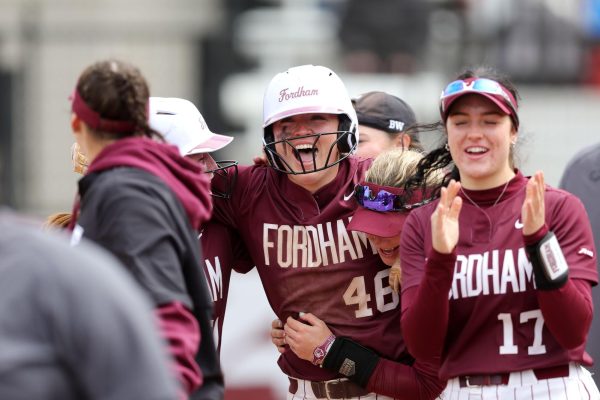Student-Athlete Column: The Comeback

Being a “girl dad” means the father of a woman. But it also means so much more.
As a collegiate athlete, the sport you compete in plays a significant role in shaping your identity. You schedule class and work around practice and conditioning. You relieve stress by lifting weights or taking reps. Your teammates are your best friends — the people you spend all day training beside that still want to hang out with you afterwards. Even though you call yourself a “student”-athlete, it’s hard during season to remember there’s something more important in life than winning an Atlantic 10 title. So when you’re injured, your whole world gets rocked to its core.
Unfortunately, it’s one of the most common, relatable and unavoidable obstacles in competitive sports. It happens to the best, the worst, the least expecting and even those who dedicate the majority of their training to its prevention. Suffering any injury, no matter how severe, devastates an athlete both physically and mentally.
Although I consider myself lucky compared to most, I’ve still had some experience with injuries. My first real injury came in my junior year of high school. Since I had already verbally committed to playing softball in college, I thought cross-training with basketball during the winter would be a fun way to stay in shape. It was early in the season, only the third or fourth game. About five minutes into the first quarter, I jumped to save a ball from going out of bounds by deflecting it towards a teammate up the court.
Unfortunately, my leg went one direction and the rest of my body went another. I screamed and crumpled to the ground in excruciating pain, too afraid to look at my knee, which felt like it was completely detached from my leg. Naive and optimistic, I remember telling my friends after the game that I probably just strained something and would be back in no time. Instead, the MRI came back with a fully torn ACL, a partially torn MCL and a slightly damaged meniscus. Six to 10 months of rehab before “return to play.”
They always give you a range when you’re injured because when it comes to the human body, there are no certainties. It’s an extremely confusing time. There’s always someone telling you to suck it up, another person telling you to rest more and a nagging little voice inside your head telling you it’ll never feel the same again. You start questioning if your teammates are judging you or if they’ve forgotten about you altogether. Sometimes you think it’s too much, other times it’s not enough. The only thing you know for sure is how badly you want to play again.
By the time I was back on the field, about nine months post-surgery, it was fall of my senior year, and I was on the daily training grind again. After finishing as conference player of the year as a sophomore and then missing my junior season, I was ready to come out as a senior and make a statement. Sadly, my knee had other plans. I was with my mom in a batting cage working on some new hitting drills when I felt a sudden pop in my knee. The next few months were an endless cycle of playing for a few games until it hurt too bad and swelled too much, sitting out a week and then playing through it again until it became too much to stand. In the end, I lost most of my senior season and the summer before college because of my second positive MRI result: a torn meniscus in my left knee.
One of the scariest parts of being injured is the feeling of being left behind. When one obstacle sends you backwards, it feels like everyone else pushes ahead twice as fast. Fear oozes into the deepest, darkest crevices of the soul and wears your confidence down to its thinnest. Jake Baker, a baseball player at Fordham, recently reminded me of a Teddy Roosevelt quote that resonates strongly with me: “comparison is the thief of joy.” The more you concern yourself with the condition of others during rehab, the less energy you’ll have left to focus on yourself.
Anyway, in Oct. 2017, a little over halfway through the first fall season as an NCAA student-athlete, I was hit with my third positive MRI result. After recovering as fast as possible from my arthroscopic surgery in the summer to be able to play at Fordham, a simple misstep on a cut-off play in the outfield ended with another trip to the hospital for another meniscal repair surgery.
To be fair, surgery isn’t all bad. You leave the hospital rocking a new pair of socks, they prescribe you unnecessarily heavy doses of painkillers, your friends buy your favorite candy or snacks and you’ll have cool scars people will ask you about the rest of your life. If you hate running, you won’t have to do that for a while, and strangers are a tad bit nicer than they would be if you weren’t hobbling around on crutches. Life is pretty good, untli you wake up at 3 a.m. with second night soreness and reality hits you like a fastball to the face.
In my fourth knee surgery, after I tore my meniscus for a third time and a few weeks before the start of my sophomore spring season, the doctor found that my ACL graft from my first surgery was stretched out to the point where I could either redshirt and rehab like crazy (enough to pass a stress test and play with a brace) or endure another ACL reconstruction. I chose to rehab, and so far that was one of the best decisions of my life. In less than a week, I’ll finally get to start a season in college fully healthy, fully healed and with more confidence than I’ve had in a long, long time.
For me, the physical part of rehab is the easy part; it’s the mental side that will drag you down. It’s the separation from your team when they talk about today’s practice or last night’s game. It’s the loneliness of sitting in your room icing and elevating while the rest of the world moves on without you. It’s the frustration of still having so many days to go until things feel normal. It’s the overwhelming anxiety of getting hurt while completing mundane actions that used to be part of your everyday life. The hopelessness of “why me?,” “why now?,” and “how am I gonna get through all this again?”
So, how do you get through it? For me, it’s learning to embrace the clichés. For example: take it day by day. If you start worrying about the far-out future, it’ll be hard to get done what needs to get done in the present. Secondly, focus on the little victories, the silver linings. It’s a process, not an overnight fix, and you have to learn to give yourself credit where and when it’s due. You have to give yourself a reason to wake up and do it all again in the morning. Finally, you’re never alone. Lean on your family, friends, teammates, coaches, trainers and doctors. They all want you to succeed, and they all want to help. If you’re spiritual, pray, and if you’re not, find another way (journaling, music, talking, etc.) to express yourself so everything isn’t so bottled up. I know it may not seem like it now, but you can and will come back stronger than ever. The experience of being injured will teach you more about yourself, your love for your sport and your ability to bounce back than you would’ve ever known before.







































































































































































































Joseph Maniscalco • Feb 6, 2020 at 9:36 pm
thanks for sharing your perspective and experiences. That which does not destroy us will make us stronger. As a fellow Ram baseball player I had my share of ups and down and agonies and victories. You appear balanced and resilient. Stay the course. Have a Faith in the Lord that things will work out the way they are supposed to in the end. I could not have imagined how things would have worked out but I am grateful and appreciative of the failures defeats and struggles I dealt with along the way. Go Rams!!!
Mark Marshall • Feb 6, 2020 at 6:22 pm
One of the hardest workers I have ever trained .